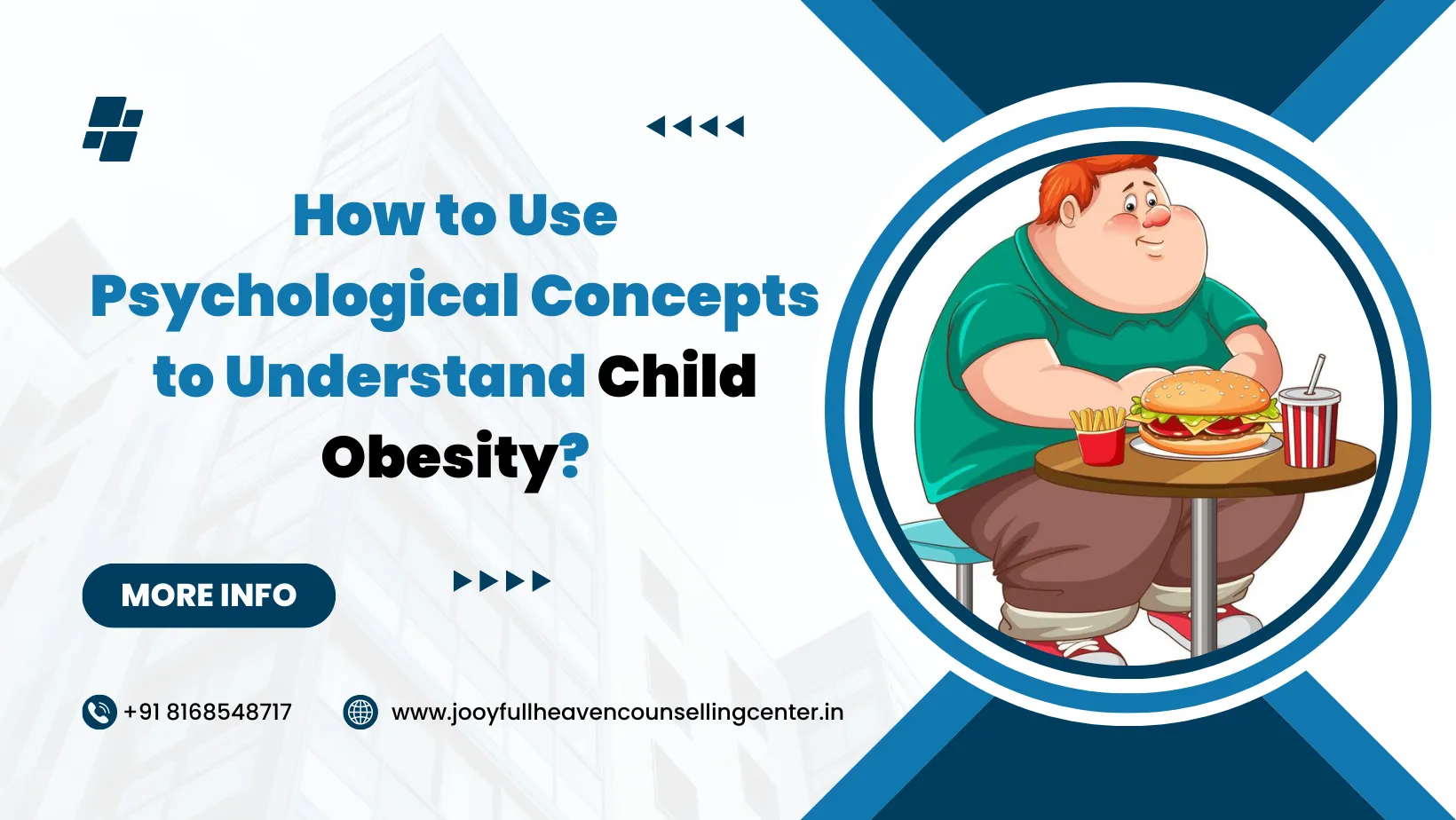
Child obesity has lately become an epidemic in most countries, and every year millions of children fall into this category. Although diet and exercise seem to be some apparent factors, some psychological concepts explain why this actually happens. In this blog post, we are going to delve deeper into how psychological factors affect eating behaviour, body image, emotional well-being, and family life—in other words, a complete insight into child obesity beyond eye level. To understand these deep causes of obesity in children that may eventually last for their whole lifetime, issues such as emotional eating, poor self-esteem, peer pressure, and lifestyle influence from the family will be critically analyzed.
Childhood obesity is more than the sum total of a poor diet and lack of physical activity. Psychological factors play a much larger role in the development of unhealthy eating patterns and sedentary lifestyles. In most cases, child counseling can be an important intervention to address these underlying psychological factors. Here are some key psychological concepts that help us understand the causes of childhood obesity:
One of the key psychological causes of overeating in children is emotional distress. Anxious, sad, or stressed children may automatically turn to food for consolation, just like adults do. Emotional eating has become a common entity of unhealthy relationships with food. Children, for instance, may seek high-calorie, sugary foods when they have emotional issues such as bullying problems, parental separations, or pressures at school, leading to weight gain.
Stress is an important factor both in overeating and obesity. Scientists have also shown that excessive cortisol levels from the stress response stimulate the appetite and tend to eat poor diets. Therefore, children brought up in stressed environments are more likely to develop obesity due to the effects of chronic stress on their eating habits. Manageability of stress and conflict can better help the children cope with their emotional triggers leading to lower cases of over-eating from emotional stress. Stress causes other problems and handling these problems effectively will be important for healthier management of their diets and lifestyle.
Low self-esteem can cause children to embrace overeating more readily. Studies related to psychology find that an individual with low esteem of the body might start managing their feelings with food or attempting to get back some sense of control by taking it. Cycles of dieting and bingeing further complicate the issue of obesity.
The family environment is, perhaps, an even more salient factor in shaping eating behaviours and food attitudes for the child. Related psychological ideas dealing with the concepts of family relationships often clarify what factors most frequently determine the effect that home life exerts on weight and health.
The number of parenting styles is different and, in many cases, contributes to higher levels of childhood obesity. For instance, authoritarian parents tend to establish rules that children are not able to discuss and argue about; such deprivation causes them to seek out unhealthy foodstuffs by sneaking and having an unhealthy relationship with foodstuffs. Meanwhile, permissive parents tend to allow children some leeway concerning the boundaries of foodstuffs, and they end up being victims of their unhealthy eating habits.
Emotional support and nurturing from the parents to children help reduce their tendency to become emotionally dependent on food. Lack of emotional support or being ignored by the parent might lead them to seek food as a way of consolation. Attachment theory indicates that children develop normally in their emotional and psychological life, with regard to body weight, only when they experience a secure emotional attachment with the caregiver.
Besides family dynamics, childhood obesity is significantly affected by the social and environmental setting. Psychological factors include peer pressure, societal expectations, and cultural norms that influence the child’s choice of eating and activity.
Children’s dietary habits are strongly influenced by the people they are around. When a child hangs out with buddies who snack on junk food or who spend all their time gaming instead of going out to play, they learn to do so as well. This is termed social learning whereby children learn from others through observing and imitating them, usually role models.
Modern media, in the form of television, social media, and digital advertising, plays a great role in moulding the perceptions that children have towards food. Such advertisements for junk food and sweet drinks create psychological associations between food and reward, thereby leading to unhealthy eating patterns. Children exposed to such messages tend to have distorted views about food, linking it to pleasure rather than nourishment. In such instances children are advised by a psychologist in Jaipur or any other certified professional, aiding them in overcoming the harmful relationships that food has with people and the psychological ramifications that result from the influence of media.
Childhood overweight is more than just an issue with physical health. There are psychological, cognitive, and behavioural aspects that are associated with eating habits that need mental interventions to prevent the problem and for treatment. Here are some strategies:
It is a very effective psychological intervention in which children can be taught to identify and then change unhealthy eating habits with cognitive behaviour therapy. CBT makes children realize the connection between thoughts, feelings, and behaviour and allows them to choose healthier food options to break the cycle of emotional eating.
Since the family has a great say in deciding eating patterns, family-oriented interventions are supposed to be of extreme importance for the treatment of obesity in children. They force the whole family to build healthy habits, such as cooking nutritious dishes, participating in sports, and communicating effectively with each other about food. This approach resonates with the theory of the family system, as it centres on how the family members affect each other’s behaviour. A Family Counselling Centre can assist the family in this manner by providing support, strategies, and counselling to make things better within a family system. It may help improve the family dynamics and, hence, healthy habits among every member of the family for a long time.
Another important development for emotional health and well-being is helping a child have a good body image with high self-esteem.
Allowing children to have the opportunity to reflect on their strengths and fostering a sense of acceptance can help prevent unhealthy weight-related behaviours and emotional eating, such as appreciating their bodies for what they can do rather than for appearance.
The psychological approach opens new avenues in the treatment of this complex issue: childhood obesity. Emotional eating, stress, self-esteem, family dynamics, and social influences are all crucial components in the development and treatment of childhood obesity. By integrating the concepts and interventions of psychology, we can better create holistic approaches to prevention and treatment—ultimately supporting children in leading healthier, happier lives.
1. How does emotional eating contribute to obesity among children?
The condition where the children are supposed to eat is because they feel frustrated, tense, anxious, or sad, therefore letting off their emotions. This condition would then bring the case of overeating or excessive intake of foods that may have poor health-related outcomes; most of the outcomes will result in gaining weight.
2. How does stress level affect the aetiology of obesity in children?
The stress will make the hormone cortisol more released which, in turn, increases hunger and cravings for calorie-dense foods. Children in an environment full of stress related to bullying at school, family problems at home, and academic pressure have a chance to have high cortisol levels leading to the intake of calories that can lead to obesity.
3. Role of family in obesity among children?
Family dynamics play the most important role in the life of a child and define his or her eating habits and lifestyle. Parenting styles, emotional support, and family behaviours influence the perception of children about food and their eating patterns. For instance, permissive or authoritarian parenting and lack of emotional support lead to inappropriate coping mechanisms like emotional eating.
4. Is the enhancement of self-esteem going to prevent childhood obesity?
Yes, the enhancement of self-esteem is the most important prevention of childhood obesity. Children who have higher self-esteem are less likely to do emotional eating and may not have problems with body image. Involving children and teaching them their strengths so they can learn to appreciate their bodies for their capabilities rather than how they look could help promote healthy eating behaviours and prevent weight gain.
Also Read: Healing and Hope: Women’s Counseling for a Brighter Tomorrow
